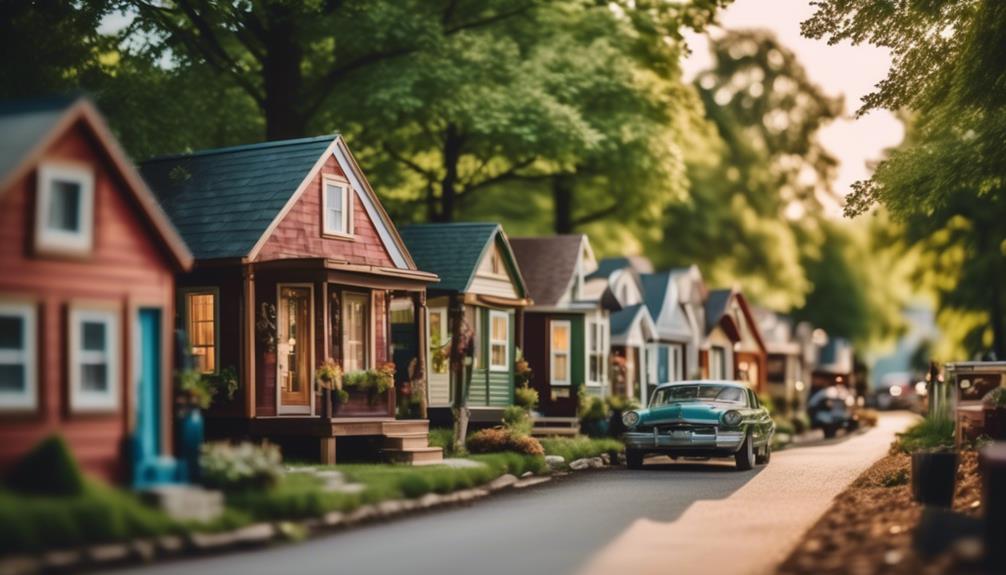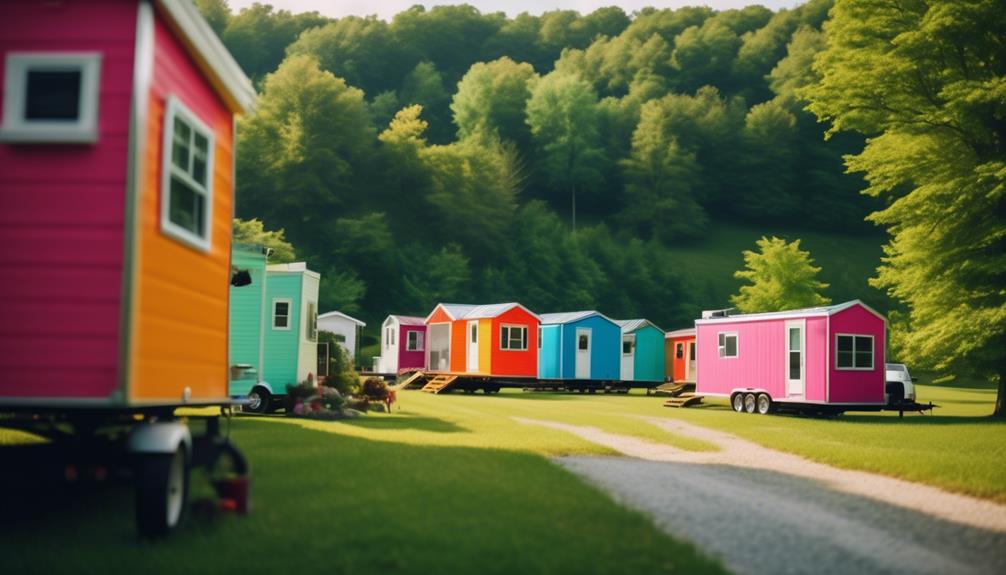Kentucky's commitment to the tiny house movement is becoming increasingly evident as the state sees a rise in the number of builders and a supportive legal framework. With cities like Frankfort and Louisville leading the way in terms of zoning regulations and building codes, Kentucky has become a destination for individuals seeking a more affordable and sustainable way of living.
Moreover, the state boasts a range of reputable builders, such as Mighty Small Homes and Ky Tiny Homes, offering options for those interested in purchasing or customizing their own tiny house. But that's not all – Kentucky also has a number of trailer dealers providing a convenient solution for transporting these compact dwellings.
With all these exciting developments, it's clear that Kentucky is at the forefront of the tiny house movement, making it an intriguing topic to explore further.
Key Takeaways
- Kentucky has legal regulations for tiny houses on foundations, following Appendix Q from the 2018 International Residential Code.
- The legality of tiny houses on wheels varies in different cities and counties in Kentucky, with some allowing them with permits, some classifying them as recreational vehicles, and some banning them altogether.
- Louisville has specific laws and zoning requirements for tiny homes, treating those on foundations differently from portable tiny houses on wheels.
- Frankfort and Louisville are known as tiny house-friendly cities in Kentucky, with zoning regulations and building codes that accommodate tiny houses and provide opportunities for sustainable living.
Legal Status of Tiny Houses in Kentucky
Tiny houses on foundations in Kentucky are legal, following the regulations outlined in Appendix Q of the 2018 International Residential Code. Appendix Q provides guidelines for designing and building tiny houses used as single-dwelling units.
In Kentucky, houses that are 400 square feet or less have certain requirements, such as ceiling height, loosened. However, the legality of tiny houses on wheels varies depending on the city or county. Some cities allow tiny homes on wheels with permits, while others classify them as recreational vehicles or have banned them altogether. It is important to contact the local municipality to determine if living in a tiny house on wheels is allowed.
Additionally, some cities in Kentucky have incorporated tiny houses into their zoning codes, while others have restrictions that make it illegal to live in a tiny home. Building permits for tiny houses in Kentucky are subject to municipal codes that outline the requirements and standards for construction. It is essential to research and comply with these specific codes to ensure legal compliance.
Tiny House Costs in Kentucky
The cost of purchasing a tiny house in Kentucky can range from $25,000 to $200,000, depending on factors such as size, materials, and customization. This makes tiny houses an affordable housing option compared to traditional homes.
Here are some key points to consider:
- Financing options for tiny houses in Kentucky: There are various financing options available for those interested in purchasing a tiny house in Kentucky. These options include personal loans, RV loans, and even some traditional mortgage lenders that offer financing for tiny homes.
- Benefits of living in a tiny house in Kentucky: Living in a tiny house in Kentucky offers several benefits. Firstly, it allows for a simpler and more minimalist lifestyle. Secondly, tiny houses require less maintenance and utility costs, leading to potential financial savings. Lastly, living in a tiny house promotes sustainability and a smaller carbon footprint.
Tiny House Friendly Cities in Kentucky

Frankfort and Louisville are known for their friendliness towards tiny houses, making them ideal cities in Kentucky for those interested in living in small, sustainable homes. These cities have embraced the tiny house movement by implementing zoning laws and building codes that accommodate tiny houses. They provide opportunities for individuals to live in tiny house communities and enjoy a lower cost of living while still having access to urban amenities. To further illustrate their commitment to the tiny house movement, here is a table highlighting some key features of Frankfort and Louisville's tiny house-friendly environments:
| City | Tiny House Community Development | Tiny House Zoning Laws |
|---|---|---|
| Frankfort | Yes | Yes |
| Louisville | Yes | Yes |
These cities prioritize the development of tiny house communities and have established zoning laws that support the construction and occupation of tiny houses. This enables residents to enjoy the benefits of small, sustainable living while contributing to a vibrant and innovative community.
Tiny House Builders in Kentucky
Kentucky's commitment to the tiny house movement extends to the availability of reputable builders within the state. These builders offer innovative designs and utilize sustainable materials for tiny homes. Here are three notable tiny house builders in Kentucky:
- Mighty Small Homes in Louisville, Kentucky, offers six tiny house kit designs for purchase. Their designs, including Modern, Contemporary, Ranch, Cottage, Carriage, and THOW, cater to various design preferences.
- Ky Tiny Homes in Nicholasville, Kentucky, specializes in prefabricated tiny house models. They offer a Western red cedar tiny house and a 20-foot tiny home, providing options for those seeking a specific style or size.
- Beckley Tiny Homes in central Kentucky focuses on custom tiny house builds and designs, allowing individuals to create a personalized space that suits their needs and preferences.
These builders are at the forefront of tiny house design trends and emphasize the use of sustainable materials, making them ideal choices for those looking to join the tiny house movement in Kentucky.
Tiny House Trailer Dealers in Kentucky

In Kentucky, individuals seeking to purchase a trailer for their tiny house have several reputable options available to them.
West Kentucky Trailer Sales in Murray offers a variety of trailers suitable for tiny houses, including utility trailers, open car trailers, and gooseneck trailers.
T.P.D Trailer Sales in Dexter provides unique trailers such as gooseneck, car hauler, and equipment trailers. Both dealerships offer financing options through Sheffield Financial.
Additionally, J&T Trailers in Lebanon offers enclosed cargo trailers and open car haulers, as well as custom trailer design options.
These dealerships provide opportunities for individuals to find the perfect trailer for their tiny house, whether they need a basic utility trailer or a customized option.
With financing options and custom design choices, individuals can create the perfect foundation for their tiny home in Kentucky.
Municipal Codes and Regulations for Tiny House Construction in Kentucky
When considering the construction of a tiny house in Kentucky, it is crucial to understand and adhere to the municipal codes and regulations that govern the building process. Understanding the zoning regulations for tiny houses in Kentucky is essential to ensure compliance with local laws and restrictions. Here are three key points to consider:
- Benefits of living in a tiny house in Kentucky:
- Lower cost of living compared to traditional homes.
- Reduced maintenance and utility costs.
- Access to urban amenities in tiny house-friendly cities like Frankfort and Louisville.
- Zoning regulations for tiny houses in Kentucky:
- Tiny houses on foundations are legal statewide, following Appendix Q of the 2018 International Residential Code.
- The legality of tiny houses on wheels varies by city or county, with some allowing permits and others banning them.
- It is important to contact your local municipality for specific information on laws and restrictions.
Frequently Asked Questions
Are There Any Financial Incentives Available for Building or Living in a Tiny House in Kentucky?
Financial benefits and tax incentives for building or living in a tiny house in Kentucky may vary. It is advisable to research and consult with relevant authorities to determine if any incentives are available in your specific area.
What Are the Regulations and Requirements for Connecting Utilities to a Tiny House in Kentucky?
Regulations and requirements for connecting utilities to a tiny house in Kentucky vary depending on the city or county. It is essential to research and comply with local codes and contact relevant authorities for specific guidelines and restrictions.
Are There Any Restrictions on the Location or Placement of Tiny Houses in Kentucky?
Location restrictions and zoning regulations for tiny houses in Kentucky vary depending on the city or county. Some cities allow tiny homes with permits, while others classify them as recreational vehicles or have banned them altogether. It is important to consult local authorities for specific laws and restrictions.
Are There Any Age Restrictions for Living in a Tiny House in Kentucky?
There are no specific age restrictions for living in a tiny house in Kentucky. However, zoning regulations may dictate where tiny houses can be located, so it is important to consult local authorities for information on applicable laws.
Are There Any Specific Building Materials or Construction Methods Required for Tiny Houses in Kentucky?
Building materials and construction methods for tiny houses in Kentucky must comply with the International Residential Code (IRC) and Appendix Q. While specific requirements may vary, it is essential to adhere to these regulations to ensure compliance and safety.
Conclusion
Kentucky's progressive approach to the tiny house movement is evident through its supportive legal framework, affordable costs, and friendly cities.
The state offers a range of options for individuals seeking a sustainable and affordable housing alternative. With numerous builders specializing in tiny house construction and trailer dealers providing convenient transportation solutions, Kentucky remains at the forefront of this growing trend.
As the tiny house movement gains momentum, Kentucky continues to provide an environment that embraces innovation and offers opportunities for individuals to embrace a simpler way of living.

